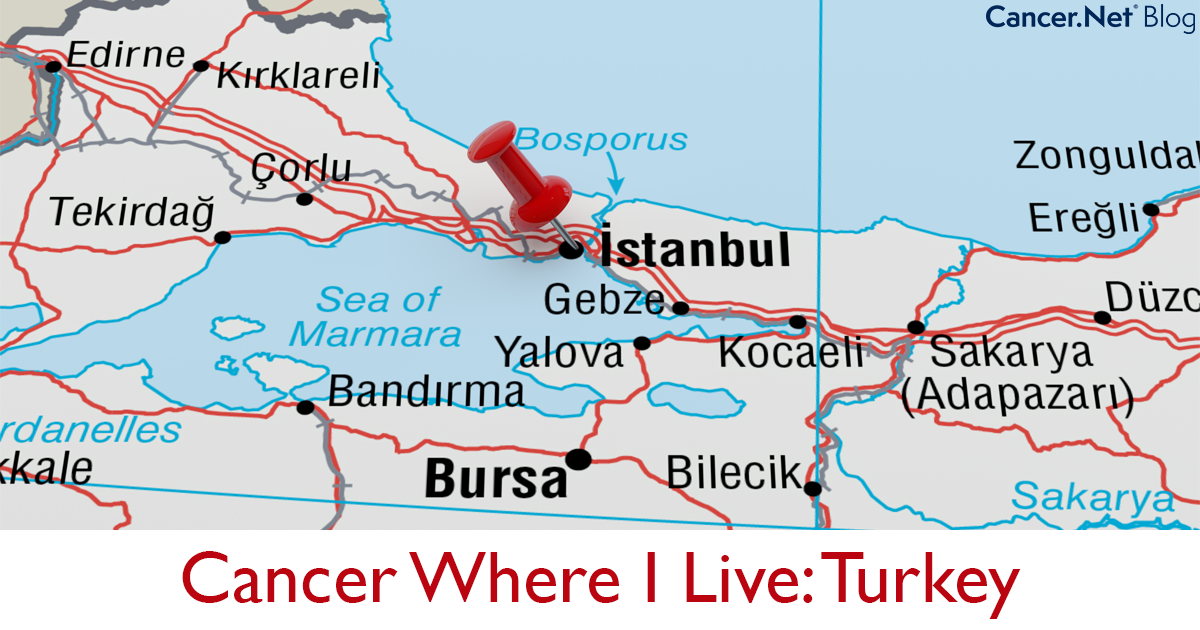
Cancer in My Community is a Cancer.Net Blog series that shows the global impact of cancer and how people work to care for those with cancer in their region. Ulku Miray Yildirim, MD, is a pediatric hematologist and oncologist working at Istanbul University, Oncology Institute. Dr. Yildirim is a doctoral student in the Palliative and Supportive Care in Patients with Cancer Program at Istanbul University. She is also a 2023 American Society of Clinical Oncology (ASCO) International Development and Education Awards in Palliative Care (IDEA-PC) awardee and a 2023 International Society of Pediatric Oncology (SIOP) media ambassador.
Why I care for people with cancer
During my residency training in pediatrics, my experiences from the time I spent in the pediatric hematology-oncology division led me to follow a career as a pediatric hematologist and oncologist. I saw the devotion of the doctors in this specialty and how they would try to treat all children who came to see them. It made me believe that there was something I could also do for these children and their families.
After completing my training, I was assigned to a hospital where there was no oncology clinic. There, I founded a pediatric oncology clinic with one of my colleagues who was assigned to the same hospital after me. While working as a pediatric hematologist and oncologist, I started to think that there were ways I could heal my patients beyond just treating their cancer. In 2021, Professor Rejin Kebudi, an authority in the field of pediatric oncology and the 2018 recipient of the ASCO International Women Who Conquer Cancer Mentorship Award, offered me the opportunity to work with her at Istanbul University. After I saw her interest and work in palliative and supportive care in people with cancer, I realized that it was possible to heal my patients beyond their cancer-directed treatment.
In 2021, Professor Kebudi started a PhD program called “Palliative and Supportive Care in Patients with Cancer” at Istanbul University. This program was the first of its kind in Turkey. I was the program’s first English curriculum student. And with Dr. Kebudi’s mentorship, I received the ASCO IDEA-PC award in 2023. Through this award, I was able to observe how palliative and supportive care was delivered in the United States at Stanford University. There, I saw how much work needed to be done to develop pediatric palliative and supportive care in my country.
What childhood cancer is like in Turkey
About 3,000 children are diagnosed with cancer every year in Turkey. Historically, most patients were diagnosed at advanced stages due to delays in diagnosis and treatment. However, over the past several decades, there has been an effort toward increasing awareness in the community, including among primary care providers, about cancer detection, which can lead to earlier diagnosis.
In 2002, Turkey underwent a health care reform that allowed for easier access to health care services and gave all children free universal health insurance. This meant children could be admitted to health centers for cancer diagnosis and treatment free of charge. These advances have begun to ensure that children with cancer receive care in a timely manner.
Addressing palliative and supportive care in Turkey
The first pain unit for adults with cancer was established at Istanbul University in 1986. In 2010, the first palliative and supportive care unit to include children with cancer was established at Dokuz Eylul University Oncology Institute in Izmir. However, there is currently no center serving only children with cancer, and education related to palliative and supportive care is still not included in medical school or residency training programs. It is mostly delivered through scientific oncology meetings.
Doctors and nurses working in intense and difficult conditions in pediatric cancer centers often try to provide palliative and supportive care themselves, but this can sometimes lead to burnout in these health care professionals. The Ministry of Health has initiated the Pallia-Turk project, which focuses on the implementation of a palliative and supportive care model with family physicians, nurses, and home care teams so that people with chronic diseases can receive basic palliative and supportive care services. However, there is a great need to increase the number of pediatric palliative care specialists and centers.
How the Turkish government is working to improve access to cancer care
The Ministry of Health in Turkey launched the Health Transformation Program after 2012. The main purpose of this program is “providing accessible, qualified, and sustainable health services for everyone in an effective, quality, efficient, and equitable manner.” Turkey used to have several different social security programs with different accessibility rules. Turkey’s General Health Insurance was established by this program and combined the social security programs all under one roof. Now, health services for all citizens are covered by the Social Security Institution. In 2013, Turkey also enacted its first asylum law, which allows refugees living in Turkey to receive treatment free of charge in certain state and university hospitals.
Overall, the health services provided by the Ministry of Health of the Republic of Turkey are very important. They provide cancer treatment to every citizen and refugee for free. We hope that the number of pediatric palliative care centers will increase in the near future, too.
Where patients can find local resources and support
People with cancer can find more information through the website of the Ministry of Health of the Republic of Turkey. They can also find more information on the Presidential Communications Center’s (CIMER’s) website.
The author has no relevant relationships to disclose.









